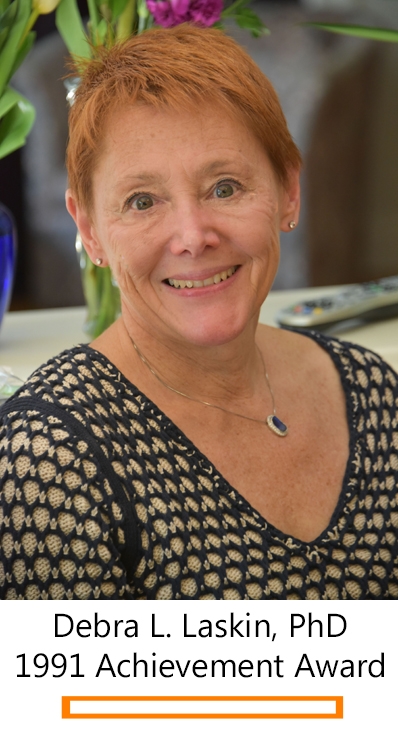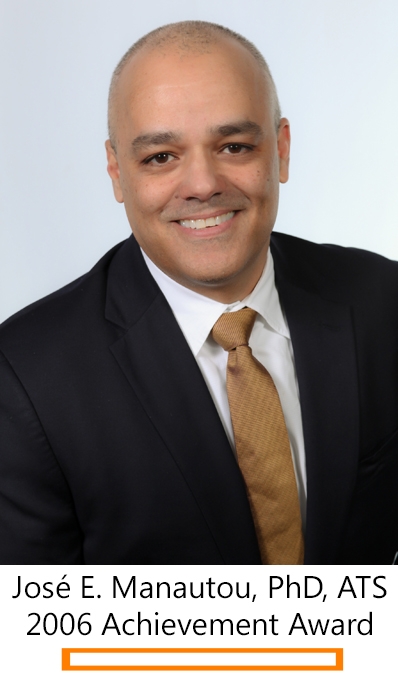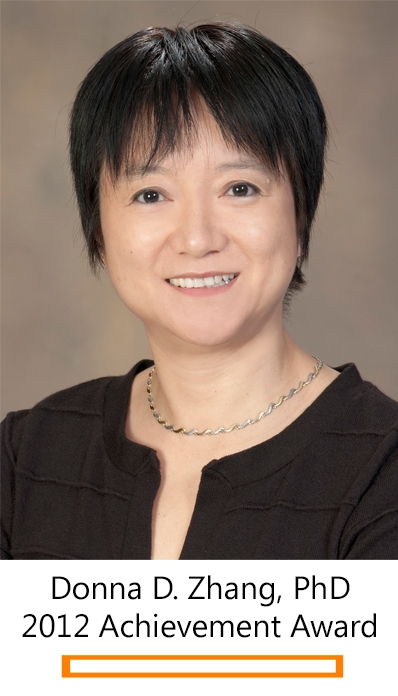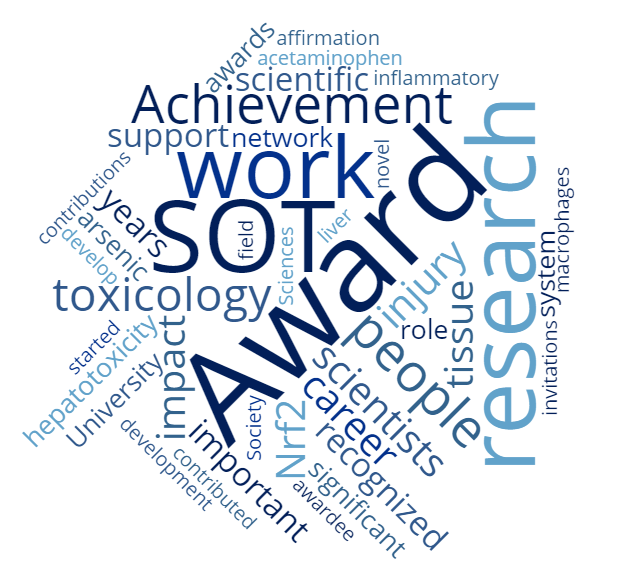
The SOT Achievement Award is one of the two oldest awards bestowed by SOT and focuses on early career scientists, recognizing those who have made significant contributions to toxicology within 15 years of obtaining his/her highest earned degree. To discover the impact of the award on its recipients, I spoke with SOT Achievement Award recipients from the past three decades: Debra L. Laskin, PhD, Rutgers University, 1991 awardee; José E. Manautou, PhD, ATS, University of Connecticut, 2006 awardee; and Donna D. Zhang, PhD, University of Arizona, 2012 awardee.
What research contributed to receiving the SOT Achievement Award?
 Debra Laskin: My research is focused on the role of macrophages and inflammatory mediators in tissue injury, an area I have been investigating for more than 35 years. My initial focus was on acetaminophen (APAP)-induced hepatotoxicity. We were the first group to suggest that that hepatocellular necrosis is due, not only to direct effects of APAP metabolites on the liver, but also to the actions of inflammatory macrophages responding to APAP-induced injury. Prior to my studies, no one had considered the idea that there was a “dark side” to innate immune system activity, and that this could be targeted for therapeutic intervention. This seminal work, first published in 1986, was recognized by SOT, who awarded me the Frank R. Blood Award for best paper in Toxicological Sciences in 1988. [Editor’s Note: This award has been renamed over the years and is now the Toxicological Sciences Paper of the Year Award.] My research played a major role in steering many investigators into considering phagocytes as active participants in the progression of chemically-induced tissue injury.
Debra Laskin: My research is focused on the role of macrophages and inflammatory mediators in tissue injury, an area I have been investigating for more than 35 years. My initial focus was on acetaminophen (APAP)-induced hepatotoxicity. We were the first group to suggest that that hepatocellular necrosis is due, not only to direct effects of APAP metabolites on the liver, but also to the actions of inflammatory macrophages responding to APAP-induced injury. Prior to my studies, no one had considered the idea that there was a “dark side” to innate immune system activity, and that this could be targeted for therapeutic intervention. This seminal work, first published in 1986, was recognized by SOT, who awarded me the Frank R. Blood Award for best paper in Toxicological Sciences in 1988. [Editor’s Note: This award has been renamed over the years and is now the Toxicological Sciences Paper of the Year Award.] My research played a major role in steering many investigators into considering phagocytes as active participants in the progression of chemically-induced tissue injury.
José Manautou: When I came to UConn, I started doing a postdoc with Steve Cohen, a past president of SOT [1998‒1999], working within his area of acetaminophen hepatotoxicity and understanding how the reactive intermediate of acetaminophen binds to target proteins. While working on that, I started looking into the area of drug transporters and their role in drug-induced hepatotoxicity so that became my area of expertise. I also worked on the hepato-protective properties of peroxisome proliferators.
Donna Zhang: I had been working on the Nrf2 signaling pathway. My initial NIEHS [National Institute of Environmental Health Sciences] ONES [Outstanding New Environmental Scientist] Award was to study how to use activation of Nrf2 as a strategy to reduce arsenic toxicity and carcinogenicity—how to take advantage of Nrf2 activation to boost your own body’s protective mechanisms to remove carcinogens, including arsenic.
Is your current research connected to the research for which you received the SOT Achievement Award?
Zhang: I’ll be researching Nrf2 until I retire or die. I still have such a huge passion for arsenic and Nrf2 research.
 Manautou: We’re still working on those two areas: drug transporters and heptato-protective chemicals. We have been able to embrace state-of-the-art technology to take our work to the next level. We’re using ’omics approaches that allow us to identify a subset of novel genetic determinants of susceptibility to chemicals that produce hepatotoxicity. And not only identifying novel genetic determinants, but we’re in the process of characterizing their function in the liver and what is it that these particular genes do that allows the tissue to adapt to toxicant exposure.
Manautou: We’re still working on those two areas: drug transporters and heptato-protective chemicals. We have been able to embrace state-of-the-art technology to take our work to the next level. We’re using ’omics approaches that allow us to identify a subset of novel genetic determinants of susceptibility to chemicals that produce hepatotoxicity. And not only identifying novel genetic determinants, but we’re in the process of characterizing their function in the liver and what is it that these particular genes do that allows the tissue to adapt to toxicant exposure.
Laskin: My research continues to be focused on inflammatory mechanisms of tissue injury induced by toxicants such as APAP, but over the years, it expanded beyond the liver into other tissues, most notably, the lung. We have been particularly interested in air pollutants, such as ozone and particulate matter and, more recently, mustard vesicants, which are used as chemical warfare agents. We continue to make important discoveries that will likely lead to novel efficacious approaches to treating tissue injury and disease pathogenesis.
So the SOT Achievement Award had an impact on your career?
Laskin: Definitely! It was amazing to be recognized at such an early point in my career. I was quite excited by the research we were doing on the role of macrophages in tissue injury and its potential impact. The fact that members of the toxicology community also viewed the work as highly significant had a huge impact on me, as it strengthened my resolve to continue working in this field. It also led to numerous invitations to give seminars at conferences and university’s both in the US and abroad. Receiving the SOT Achievement award also had a significant impact on my career trajectory, as it contributed to my advancements and promotions at Rutgers University, as well as my continued success in obtaining NIH [National Institutes of Health] support for my research.
Manautou: It definitely opened up invitations. Most of the highly recognized toxicology programs in the nation issued invitations to visit their institutions, allowing me to expand my network of colleagues and collaborators and people that were aware of my work. That certainly contributed to my ability to reach out and visit other places and to develop long-lasting relationships and friendships within toxicology—whether collaborative or just a network of people that support what you do and people that know who you are. Some of these people sit on study sections and other influential scientific panels and are aware of your work. There’s a lot to gain from interactions and what the award really did for me in terms of visibility and name recognition.
 Zhang: The award definitely enhanced my reputation in the toxicology field. Being recognized by SOT for this award was really helpful because whenever people are talking about Nr2, they think about me. The award certainly made me more known to toxicologists for my contributions to the Nrf2 and arsenic fields.
Zhang: The award definitely enhanced my reputation in the toxicology field. Being recognized by SOT for this award was really helpful because whenever people are talking about Nr2, they think about me. The award certainly made me more known to toxicologists for my contributions to the Nrf2 and arsenic fields.
Is this recognition in the field what makes the Achievement Award so valuable?
Zhang: Yes, 100 percent. It is really helpful for people at an early stage to get this award and be recognized for their research by the Society. This really promotes career development. It only took me eight years to become a full professor, and the award certainly helped.
Laskin: Absolutely! It also provides affirmation that the work you are doing is important, that you’ve make significant contributions to toxicology, and that it has impact that will guide the future of mechanistic toxicology. In this context, I think it is one of the most important awards that SOT gives.
Manautou: It was an affirmation of my mission and what I was doing. It was a confirmation that I was basically on the right track and that what I was doing was worthwhile. Some people see these awards and distinctions as compensation for their efforts, but to me, it just went beyond that. I saw it as an affirmation that I was doing what I was meant to do all along.
Looking back on your careers prior to and since receiving the SOT Achievement Award, what advice do you have for today’s early career scientists and students?
Laskin: Be persistent. Don’t be afraid to talk to more senior scientists about your research; not only is it important to get feedback, but also to convincingly argue the merits of your work. It’s also important to network, develop collaborations, and identify mentors. I spend a lot of time mentoring now and making sure junior scientists are not just working in relevant and impactful areas of research, but also going to meetings, interacting with scientists, and applying for awards. This is the best part of my job right now.
Zhang: Do not just do excellent scientific research and find your niche in toxicology. It also is crucial to network and communicate with other scientists. Do not just hide in the lab, doing your own research, but collaborate with other people.
Manautou: You need a support system. Sure, you have to have the drive, the determination, and the desire to be a scientist, but we all need a support system. In my case, it’s a combination of my institution and my home scientific society, which is SOT. I started my involvement with SOT as a postdoc. I have grown with the Society. It has been my support system. It has allowed me to develop friendships that are literally lasting a lifetime. It has been extremely instrumental to my scientific development and my scientific growth. In great part, I owe my professional world to SOT. The Society has a lot to offer and remaining engaged is a key to professional development.
